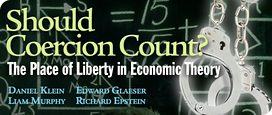Liam once again raises the proposition that libertarians and classical liberals do not have any special claim to the use of the term “liberty,” but only can claim use of one peculiar sense of the term, which then has to do battle with others. I disagree with that position. The proposition that each person is entitled to have the maximum liberty consistent with the like liberty of others is a position that only makes sense within the framework of the classical liberal system. The moment that increases in wealth through state transfers count as increases in liberty, then there is no way to preserve the like liberty between persons. The newer definition of liberty is one which lets one side be better off and the other worse off, which is, after all, what transfer systems are supposed to do.
And the difference does make a difference. The principle of freedom of contract is not idle because we believe that it can be abridged with the use of rules that improve both sides to the transaction in proportionate degree, as is often the case with formality. Nor does it become otiose if we assume that certain contracts, such as horizontal restraints on trade, should not be enforced universally because their negative effects outweigh their positive ones. The initial baseline that joint gains from contracts count as a social good is morally defensible and socially wise. No other baseline can have that result.
So much I think follows from Murphy’s last sentence, where he says, “It all comes down to the question of whether a minimum wage makes poor workers better off, and whether we care about that.” That is not the correct formulation of the problem, for it ignores the possibility that the improvement of (some) poor workers is a justification for a program that produces widespread social losses, both to other workers, some of whom are also poor, and to firms and their shareholders, and to customers and suppliers of the firms in question. The danger of Murphy’s excessive nominalism is that it now directs us to the wrong social inquiry by allowing gains to some preferred clientele to offset far greater losses to another group of individuals. Anyone who starts with a presumption in favor of freedom of contract will not make that mistake, which should be reason enough to avoid the dangerous claims of “indeterminacy” which all too often cloud social theory.

